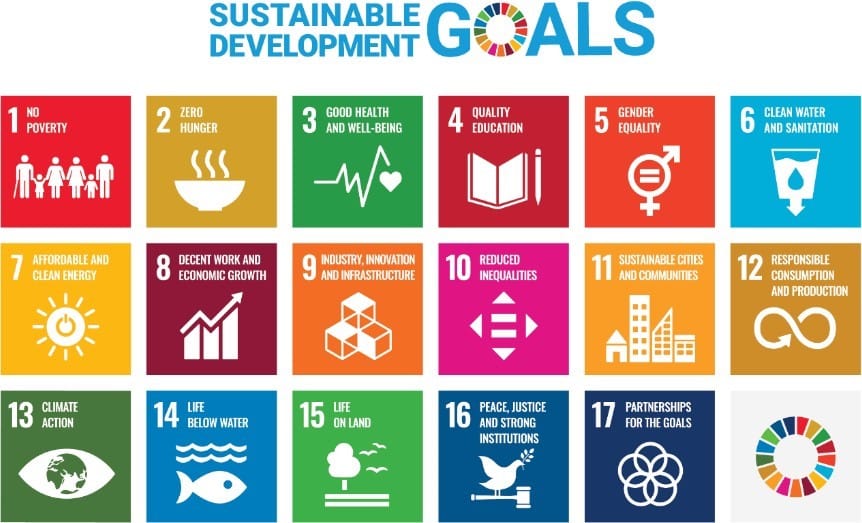
This document is the narrative on the initiatives and achievement of IUBAT of its’ commitment to UN Sustainable Development Goals. This report emphasizes pioneer role of a university in achieving SDG goals in a developing country, Bangladesh. The data and narrative in this report are factually based but may not be comprehensive or up to date. It is anticipate that this report will evolve over time based on feedback from stakeholders.
International University of Business Agriculture and Technology (IUBAT) is operating the sustainability activities under CGEC-Centre for Global Environmental Culture since 2008. The sustainability program has been taken over by IISS-IUBAT Institute of SDG Studies. IISS is especially focused on the education and research of SDGs. However, CGEC is the host of Regional Centre of Expertise (RCE) Greater Dhaka that is a UN program of Education for Sustainable Development (ESD). It is envisioned that the RCE Greater Dhaka will serve as an example of good practice to other regions facing similar sustainability challenges and issues and contribute to the goals set by the UN Decade of Education for Sustainable Development (https://www.rcegreaterdhaka.org/objectives.php). With its global network and collaboration of RCE, IUBAT had been taken many UNU University recognizable sustainability projects on: Traditional knowledge, Knowledge Based Area Development, Improvement of health of urban slum, Global action plan on ESD, Students’ sustainability engagement, Rural home centered farming for food security, Ecosystem management and Global citizenship education [ See annexure-1]. The sustainability practices operated at IUBAT includes energy saving, waste water reuse, waste management, tree plantation, reduction of carbon footprint, greening the campus etc. There is a combined effort of the faculty members, students, administration and operations lying behind as a Whole Institution Approach. This university has a nationwide impact because of playing the role of a model educational institution for sustainable activities in Bangladesh and training up resource persons for sustainability leading in Bangladesh’s future.
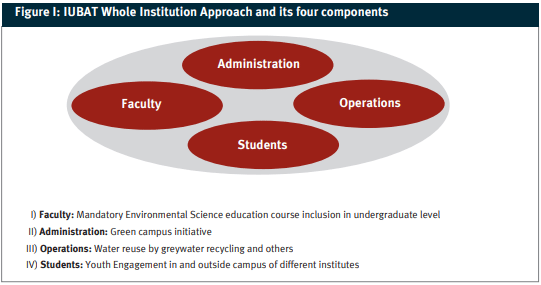
SDG 1 – NO POVERTY
IUBAT is to eradicate poverty of the country through developing skilled human resource from every corner of the society. The university is working on taking rural background students and grooming themselves through effective courses. The education loan of the university is proven successful in completing the education of the students. Tertiary education is expensive and there is limited seat capacity in public university. As a pioneer non-government university IUBAT has opened the door of higher education to the vast number of students. The institution is also working on skilled human resource development and education access to the meritorious but needy students.
TEACHING:
- There are 11 degree programs of the university to train up students for employment. This programs related to agriculture, engineering, business, arts and health sector in fulfilling the needs of the socio-economic demands of the country.
- There are 25 faculty at the IUBAT whose work is closely related to SDG1.
- There are 12 undergraduate courses at the IUBAT related to SDG1.
- Browse the course inventory at: https://iubat.edu/
OPERATIONS:
- IUBAT policy on Student Financial Support states “Higher Education for Every Qualified Person with Finance for Meritorious but Needy.” See the policy in full at: https://www.iubat.edu/kbad/
- The university provided jobs for 600 academic and non-academic stuffs among them many of the stuffs living on the poverty lines that is less than 1.5 U$ a day.
OUTREACH & PARTNERSHIP:
The KBAD Project at the IUBAT is “IUBAT has set out the long term vision of producing at least one professional graduate from each village/ward under the KBAD concept as a step towards community self-reliance. To materialize this vision and to translate the concept into reality, IUBAT has special provision for supplementing the family resources of a student through scholarship, grant, fee waiver, deferred payment, campus job, educational financing and the like. It is IUBAT policy to cater to the needs of all qualified students who aspire to higher professional education-regardless of the income level of his/her family through appropriate educational financing arrangements.”
Each year, the IUBAT Rotaract Club over 60 student volunteers work in collaboration with local people to deliver food and cloth to the most vulnerable communities.
IUBAT donated food in orphanage in several national days of the country to feed poor students.
More Info:
Link: https://www.rcenetwork.org/portal/rce-greater-dhaka
SDG 2 – ZERO HUNGER
- IUBAT was the first private institution of Bangladesh offering agriculture degree that is crucial for the agriculture based country. These skilled graduates on agriculture and technology has been working on nutrition and food security of the country.
- The university has so far 50 publication in the field of SDG-2.
- The invention that the same tree, bears two vegetables. Researchers have made such an event possible. Trees capable of producing eggplant and potato have been invented. Eggplant is on top of this tree and potato is on the bottom. Because of the simultaneous use of eggplant and potato in the same plant, the researchers combined the English term ‘brinjal’ and ‘potato’ for brinjal and named the plant ‘brinjalu or brinjal-potato.’ Abdullah Mohammad Farooq is the inventor of Brinjalu. The study, which began in November 2020, has been successful this month. The research has been completed in the research field of the International University of Business, Agriculture and Technology (IUBAT) campus in Dhaka.
- Other researches especially perennial rice cultivation is a leading research of the country. Perennial rice is crucial for climatic adaptation of rice in the country that maintains crop and soil biodiversity. Also Sweet grape production in tropical Bangladesh by Prof. Rahman.
OPERATIONS:
- There are 20 faculty at IUBAT whose work is closely related to SDG2.
- The university is maintaining a high standard by employing faculty members who are all doctoral degree holders in agriculture or natural sciences.
OUTREACH:

SDG 3 – GOOD HEALTH AND WELL BEING
The College of Nursing of the university offering nursing degree and doing research related to SDG3. In bringing up health service of the country higher degree on nursing is crucial for Bangladesh. There were 75 papers published between 2018 and 2021. The university is on the verge to open up Master in Public Health. The nursing college had done leading research on COVID-19 that was published in indexed journals
OPERATIONS:
- There are 15 faculty at IUBAT whose work is closely related to SDG3.
- The college has collaboration with many hospitals in Dhaka city.
- The institution has regular health assessment program in community level across the country. In the urban area the program is named as Street Nursing.
IUBAT NEWS RELATED TO SDG 3:
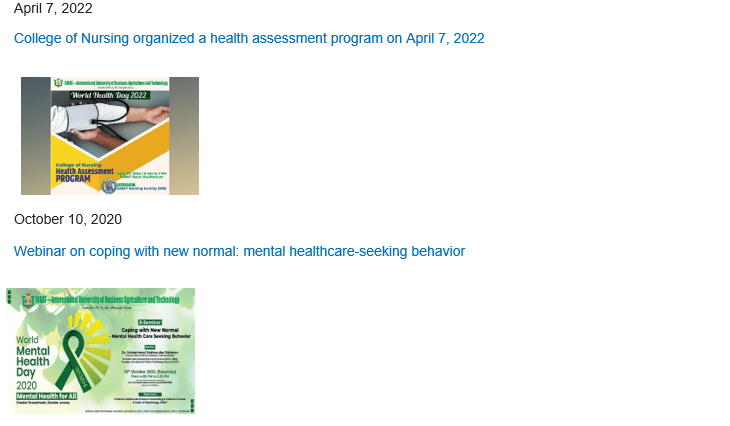
SDG 4 – QUALITY EDUCATION
- IUBAT has obtained the 601-800 position out of 1524 worldwide ranked institutions in the Times Higher Education Impact Rankings 2022. IUBAT secured 6th position among enlisted twelve Bangladeshi Public and Private Universities. In total there were 45 publications between 2018 and 2020 on SDG-4.
- IUBAT is the host of Regional Centre of Expertise (RCE) Greater Dhaka of the UN Flagship project on Education for Sustainable Development (ESD). https://www.rcenetwork.org/portal/rce-profile-detail/935
TEACHING:
- IUBAT has the mandatory ESD course for undergraduate since 2013. This course to teach sustainability to the students and build up positive attitude towards environment and sustainability.
- All the 11 degree offering program of the university is now fully designed according to OBE-Outcome Based Education.
- Browse the course inventory at: https://iiss.iubat.edu/
OPERATIONS:
- The quality teaching of the university is maintained by IQAC- Institutional Quality Assurance Cell. It provides training pedagogy, monitoring and assessment of teaching.
- There are 20 faculty at the IUBAT whose work is closely related to SDG 4.
- The IUBAT Institute of SDG Studies(IISS) offers over mandatory ESD course in 11 program areas.
OUTREACH & PARTNERSHIP:
IISS adapted UNESCO Global Citizenship Education Document in 2018.
IISS in association with UNESCO also translated Getting Climate Ready-A Guide for Schools on Climate Action and Global Education Monitoring Report 2021/22
IUBAT NEWS RELATED TO SDG 4:
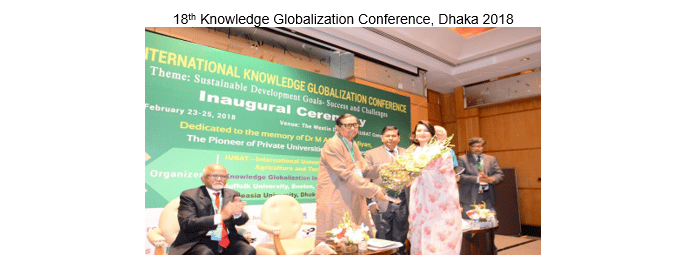
SDG 5 – GENDER EQUALITY
- IUBAT Institute of SDG Studies (IISS) is especially concerned on research related to Gender Equality.
TEACHING:
- There are 15 undergraduate courses at the University related to SDG5.
- Browse the course inventory at: https://iiss.iubat.edu/
OPERATIONS:
- There are 15 faculty at the IUBAT whose work is closely related to SDG5.
- The University 15% more scholarship is available for female students.
- Male/Female job ratio is in good progress.
- The University submitted its Final Report on Prevention and Response to Sexual Violence and subsequent.
OUTREACH & PARTNERSHIP:
The University has an ongoing study on the female participation in study and employment annually to ensure equal opportunity in gender.
IUBAT NEWS RELATED TO SDG 5:

SDG 6 – CLEAN WATER AND SANITATION
The university has 35 scholarly publications related to SDG 6 between 2018 and 2020.
The faculty members of the university is doing research on water quality index analysis of Turag River. It is to be mentioned that Turag is a much polluted river due to textile industrial pollution with an oxygen content near zero in dry season needs annual monitoring and assessment of water quality.
TEACHING:
- There are 6 undergraduate courses at the University related to SDG6.
- Browse the course inventory at: https://iiss.iubat.edu/
OPERATIONS:
- There are 5 faculty at IUBAT whose work is closely related to SDG6.
- The University used a large deep pond for rainwater harvesting in the campus area. The size of the pond is 150X150 m2
OUTREACH & PARTNERSHIP:
- The university has pioneer research and industrial projects on ETP-Effluent Treatment Plant
- The university has basic ongoing research on the water quality monitoring of the major rivers in Dhaka city.
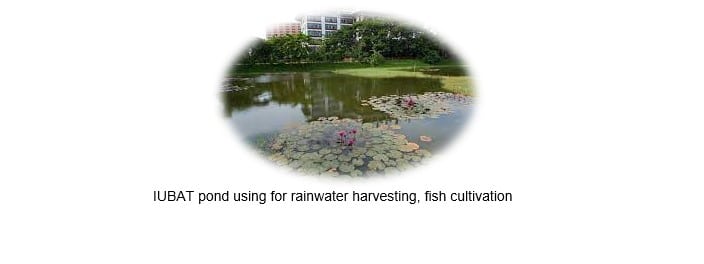
SDG 7 – AFFORDABLE AND CLEAN ENERGY
- The University has scholarly 65 publications related to SDG7 between 2018 and 2020.
TEACHING:
- There are 10 undergraduate courses at the University related to Department of Electrical Engineering is leading the renewable energy research.
- Browse the course inventory at: : https://iiss.iubat.edu/
OPERATIONS:
- There are 8 faculty at the University whose work is closely related to SDG7.
- The university building is designed to use natural air and light with no air condition in the classrooms.
- A 234 KW solar panel at the roof top of the campus building is under construction.
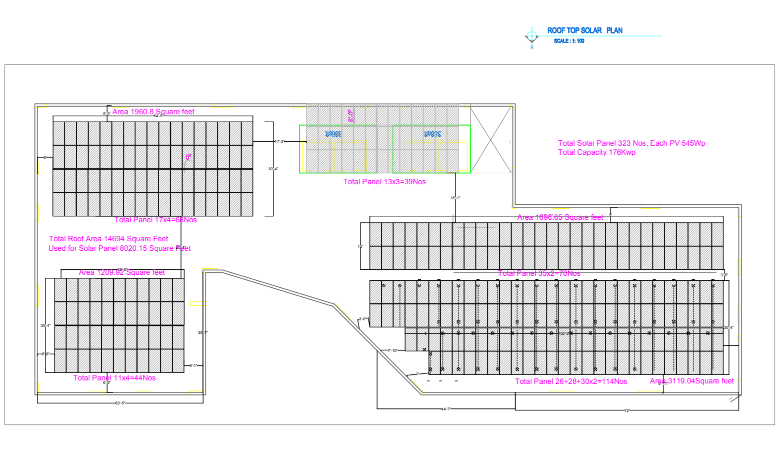
SDG 8 – DECENT WORK AND ECONOMIC GROWTH
- The University has 77 scholarly publications related to SDG 8 between 2018 and 2020.
- The university has pioneer research on Green HRM (Human Resource Management), Sustainable Leadership and Sustainable Organization.
TEACHING:
- There are 60 undergraduate courses at the University related to SDG8.
- Browse the course inventory at: https://iiss.iubat.edu/
OPERATIONS:
- There are 50 faculty at the University whose work is closely related to SDG8.
- The University has alumni and placement office for the graduates.
- The University is one of the provider of jobs for the alumni students and has many options where the undergraduates can earn and study.
NEWS RELATED TO SDG 8:

SDG 9 – INDUSTRY, INNOVATION AND INFRASTRUCTURE
- The University has 160 scholarly publications related to SDG 9 between 2018 and 2020.
TEACHING:
- There are 150 undergraduate courses at the University related to SDG 9.
- Browse the course inventory at: https://iiss.iubat.edu/
OPERATIONS:
- There are 45 faculty at the University whose work is closely related to SDG9.
- Department of Civil Engineering is a leader in education and research to developing sustainable solutions for the global community. The department conducts research across a wide range of relevant fields and the department teaches a variety of undergraduate degrees training future leaders in the development of infrastructure around the globe.
OUTREACH & PARTNERSHIP:
IUBAT Innovation Hub A collaborative ideation, learning and maker space will enable students and educators, joining with entrepreneurs, business leaders, local government officials, alumni, and educational partners, to co-create and realize the power of human innovation through cross pollination of education, business and community talent immersed in the best of startup culture.
NEWS RELATED TO SDG 9:

SDG 10 – REDUCED INEQUALITIES
- The University has 10 scholarly publications related to SDG 10 between 2018 and 2020.
- Under KBAD program stated below merit Scholarship has been given approximately BDT 164.9 million; Interest free loan approximately BDT 20 million; Special Scholarship BDT 0.66 million with a total sum 185.56 million BDT or 2.2 m USD. This unique program complies with SDG goals 4.3, 4.4 and 4.7. These goals ensure equal access of affordable, technical, tertiary and sustainable education to all leaving no one behind. KBAD is a model to eradicate educational discriminant in a nation by removing financial barriers in tertiary education.
TEACHING:
- There are 6 undergraduate courses at the University related to SDG10.
- Browse the course inventory at: https://iiss.iubat.edu/
OPERATIONS:
- There are 20 faculty at the University whose work is closely related to SDG 10.
- The University on accessible higher education to all regardless of their economic circumstances. See the https://www.iubat.edu/kbad/t for more details.
- IUBAT policy on Student Financial Support states “Higher Education for Every Qualified Person with Finance for Meritorious but Needy.”
OUTREACH & PARTNERSHIP:
The KBAD Project at the University is “IUBAT has set out the long term vision of producing at least one professional graduate from each village/ward under the KBAD concept as a step towards community self-reliance. To materialize this vision and to translate the concept into reality, IUBAT has special provision for supplementing the family resources of a student through scholarship, grant, fee waiver, deferred payment, campus job, educational financing and the like. It is IUBAT policy to cater to the needs of all qualified students who aspire to higher professional education-regardless of the income level of his/her family through appropriate educational financing arrangements.”
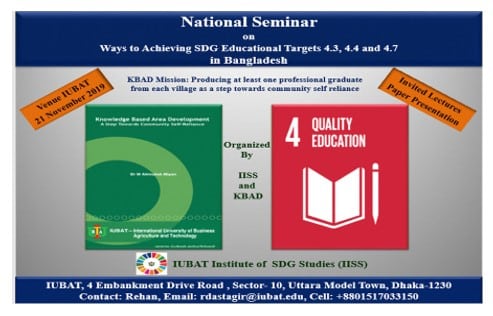
SDG 11 – SUSTAINABLE CITIES AND COMMUNITIES
- The University has 25 scholarly publications related to SDG 11 between 2018 and 2020.
TEACHING:
- There are 6 undergraduate courses at the University related to SDG11.
- Browse the course inventory at: https://iiss.iubat.edu/
OPERATIONS:
- There are 5 faculty at the University whose work is closely related to SDG11.
- IUBAT is ranked as UI GreenMetrics University of the world.
- The building material of the university is plaster free hollow brick.
- The classroom of the university using natural air and light having no air conditioner.
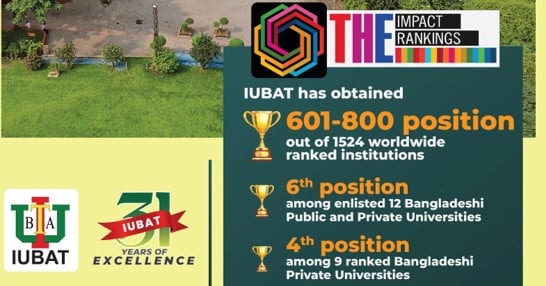
SDG 12 – RESPONSIBLE CONSUMPTION AND PRODUCTION
- The University has 25 scholarly publications related to SDG 12 between 2018 and 2020.
TEACHING:
- There are 10 undergraduate courses at the University related to SDG12.
- Browse the course inventory at: https://iiss.iubat.edu/
OPERATIONS:
- There are 5 faculty at the University whose work is closely related to SDG12.
- Recycling and waste reduction are high priorities at the University. The university kitchen waste at the fish pond. The annual profit of selling recyclable waste is 1000 U$.
- Providing bus service to carry students from all around Dhaka city.

SDG 13 – CLIMATE ACTION
- The University has 40 scholarly publications related to SDG 13 between 2018 and 2020.
- The university has leading research on climate change and disaster management.
TEACHING:
- There are 20 undergraduate courses at the University related to SDG13.
- Browse the course inventory at: https://iiss.iubat.edu/
OPERATIONS:
- There are 10 faculty at the University whose work is closely related to SDG13.
PROJECTS AND OUTREACH
- Rural Home-Centered Aggregating Farming (RHCAF) for Biodiversity Conservation, Ecosystem-based Adaptation and Climate Action.
- Training of school teachers on climate action in association of Government and UNESCO.
- Food Security and Soil Fertility of Hilly Areas of Bangladesh.
- Wetland preservation around Dhaka City Area.
- Food plant solution: Local Fruit trees Role on Nutrition on Climate Change.
- Sustainable Landscape Management for ecosystem restoration, disaster risk reduction and climate action in Bangladesh
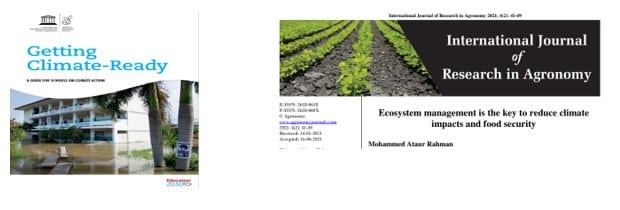
SDG 14 – LIFE BELOW WATER
- The University has 5 scholarly publications related to SDG 14 between 2018 and 2020.
TEACHING:
- There are 2 undergraduate courses at the University related to SDG 14.
- Browse the course inventory at: https://iiss.iubat.edu/
OPERATIONS:
- There are 4 faculty at the University whose work is closely related to SDG 14.
- Department of Environmental Science at the University has ongoing research on coastal ecosystem and delta management.

SDG 15 – LIFE ON LAND
- The University has 30 scholarly publications related to SDG 15 between 2018 and 2020.
- The university conducted research on plastic pollution by tourism industry and proposed sustainable solution for biodiversity conservation and resource efficient service industry.
- The university has leading research on the industrial solid waste management.
TEACHING:
- There are 12 undergraduate courses at the University related to SDG 15.
- Browse the course inventory at: https://iiss.iubat.edu/
OPERATIONS:
- There are 8 faculty at the University whose work is closely related to SDG 15.
- Department of Environmental Science at the University has ongoing research on Life on Land.
- College of Tourism and Hospitality Management is very much concerned with Eco-Tourism and care for local environment. Every year the department organizes cleaning program in the natural tourist spot of the country.
OUTREACH & PARTNERSHIP
Department of Environmental Science is to train and develop, well equipped man power to tackle the growing environmental and developmental problems and changes arising from the transition to a sustainable society. In the 21st century caring for natural resource and facing the threats of climate change there is special needs of scientific knowledge and skills that are fulfilled by the program.
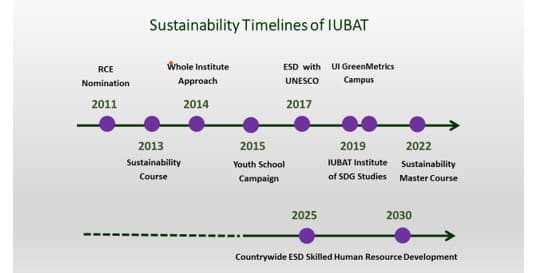
SDG 16 – PEACE, JUSTICE AND STRONG INSTITUTIONS
- The University has 10 scholarly publications related to SDG 16 between 2018 and 2020.
TEACHING:
- There are 3 undergraduate courses at the University related to SDG 16.
- Browse the course inventory at: https://iiss.iubat.edu/
OPERATIONS:
- There are 5 faculty at the University whose work is closely related to SDG 16.
- Department of English at the university has ongoing research on Peace and Justice and they publish on national dailies on various affairs showing below:

SDG 17 – PARTNERSHIPS FOR THE GOALS
- The University has 15 scholarly publications related to SDG 17 between 2018 and 2020.
TEACHING:
- There are 5 undergraduate courses at the University related to SDG 17.
- Browse the course inventory at: https://iiss.iubat.edu/
OPERATIONS:
- There are 5 faculty at the University whose work is closely related to SDG 17.
- IUBAT Institute of SDG Studies is working on Global Citizenship Education of UNESCO. The purpose of the project is to provide a pedagogical guidance to teachers of the country.
OUTREACH AND COLLABORATION
- WWOOF-World Wide Opportunities of Organic Farming Bangladesh
- Global Soil Laboratory Network( GLOSOLAN)
- Regional Centre of Expertise, RCE Greater Dhaka, a UNU Program
- Alliance of Bioversity International and CIAT
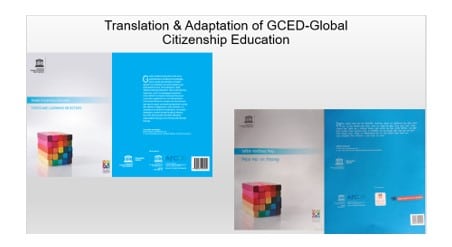
ANNEX
Founded in 1991 by Prof. Dr. M Alimullah Miyan, IUBAT—International University of Business Agriculture and Technology is the first nongovernment university in Bangladesh. IUBAT has set out the long-term vision of producing one professional graduate from each village of Bangladesh to contribute towards the creation of a knowledge-based society. Its mission is human resource development through appropriate teaching, training and guidance as well as creation of knowledge conducive to socio-economic development of developing societies in general and that of Bangladesh in particular. The university in pursuance of its mission of socio-economic development has established a Centre for Global Environment and Culture (CGEC) in 1999 which became the host of Regional Centre of Expertise (RCE) Greater Dhaka in 2011 and earned UN Flagship and Good Practice awards for spreading environmental education in 10 consecutive years (2012-2021). In 2008, IUBAT introduced a Program on Sustainability under CGEC. It has made a three credit course on Environment and Sustainability mandatory for all under-graduate students of IUBAT. To meet its commitment to contribute to the achievement of SDGs, it has established the IUBAT Institute of SDG Studies (IISS) in 2019.
IISS is an education and research focused institute on sustainable development goals. It offers Certificate and Diploma courses and a Master in Sustainability Studies. The Institute illustrates implementation and demonstration of the SDGs by way of setting several practical models of projects at the field level. It also offers consultancy services for capacity building of the institutions engaged in SDG achievement. The resource persons are taken from internal and external sources. The milestone achievement of IUBAT is given below:
- Establishment of Centre for Global Environmental Culture (CGEC) in 1999
- Started Program on Sustainability in 2003 under CGEC
- Education for Sustainability program under CGEC
- Declaration of IUBAT Green Campus on 12 Aug 2008
- Hosted of Regional Centre of Expertise (RCE) Greater Dhaka in 2011 under CGEC
- Started ESD undergrad course in 2012 mandatory for all
- Development of ESD Curriculum for Undergrads
- Participation in the IPCC: Managing the Risks of Extreme Events and Disasters to Advance Climate Change Adaptation: Special Report of the Intergovernmental Panel on Climate Change (IPCC) – 2012: Lead and Contributing Authors IPCC Working Group II. Cambridge University Press: ISBN 978-1-107-025006-6, www.cambridge.org/978117607804
- IGBP and APN on the project: Global Environmental Change and Sustainable Development-Needs for the LDCs from 2011-2014
- Published 10 High Impact Articles on Sustainable Development, Disaster Risk Reduction, Weather and Climate Extremes
- IUBAT and RCE Greater Dhaka Awarded 2nd Prize from the Ministry of Environment and Forest in Word Environment Day 2014 for its outstanding achievement on the Theme Science behind Tradition for Raise Your Voice No More Sea Level Rise
- RCE Greater Dhaka Received UN Flagship Project Award in 2013, in Nairobi for expanding ESD through Knowledge Based Area Development in Bangladesh
- IUBAT Translated and adapted UNESCO “Global Citizenship Education” Document in 2018
- IUBAT Translated UNESCO Document “Getting Climate Ready-Guide for School” in 2021.
- Over twelve thousands undergrads were trained since 2012 through ESD course.
- RCE Greater Dhaka received UNU Awards in 2012, 2013, 2014, 2016, 2017 & 2018,2019,2020 and 2021 for sustainable activities
- UNU Flagship project in 2021: Human Resource Development and the need for Financial Assistance to poor & meritorious students under the project Knowledge Based Area Development (KBAD) in COVID-19.
- Hosted 13th International Knowledge Globalization Conference 2018 on SDGs
- National Seminar on Ways to Achieving SDG Educational Targets 4.3, 4.4 and 4.7 in Bangladesh 21 November 2019
- IISS launched at 23 April 2019 focused on research and training on SDGs
- UI GreenMetrics ranked Green Campus university in 2019, 2020 and 2021
- Annually over hundred schools campaigning were done till COVID-19.
Special Achievement on ESD Activities
- RCE Greater Dhaka received 2016 RCE Award for Innovative Project in Education for Sustainable Development (ESD) Whole-institutional approach of RCE Greater Dhaka through water reuse, biodiversity conservation, and youth mobilization in commitment to the GAP on ESD Project Type: Engaging with transformative learning and research for sustainable development
- RCE Greater Dhaka received 2021 RCE Flagship Award for contribution in SDG 4 Quality Education; Thematic Category: Curriculum Development Project- KBAD-A Real Time Opportunity for Sustainability Education During Covid-19
- RCE Greater Dhaka received 2021 RCE Honorable Mention Award for contribution in SDG 4 Quality Education; Thematic Category: Curriculum Development Project- Students Engagements in Sustainability Activities
 Fig 1: Showing IUBAT Whole Institute approach on ESD [1]
Fig 1: Showing IUBAT Whole Institute approach on ESD [1]
Action Research on Environmental Sustainability
The CGEC the host of all ESD activities of IUBAT completed several action researches on Environmental Development in a Rural Community with resource support of UNDP channeled through the Sustainable Environmental Management Program (SEMP), Ministry of Environment and Forests, GOB. Implemented programs were listed below:
- Proceedings of The Dialogue on Education For Sustainability Held on August 12, 2008 at CIRDAP Auditorium, Dhaka, Bangladesh Time: 10:30 AM to 2:0 PM
- Special Plantation Program -2008: November 18, 2008, IUBAT Campus, Uttara, Dhaka
- Campaign against Turag River Pollution: November 18, 2008
- The Role of Education for Sustainability in Pollution Control: November 25, 2008, IUBAT Conference Hall, IUBAT, Uttara, Dhaka
- Participated in the Workshop on Finalization of Standing Orders on Disaster Management, organized by The Ministry of Food and Disaster Management, Disaster Management Bureau, Govt. of the People’s Republic of Bangladesh and UNDP-Bangladesh
- Bandarban Hill District, Chittagong Hill Tracts to plan for a model Sustainable Upland Agricultural and Biodiversity project.
- Workshop on Education for Sustainable Development through Community Learning Centre (CLC), Organized by UNESCO, Okayama University, Japan & Ahsania Mission, Dhaka, Bangladesh, IDB Bhaban, Dhaka, January 11-12, 2009
- Seminar on Solar Energy for High-Rise Buildings in Urban Areas: Held on July 30, 2009 at IUBAT Conference Hall, Dhaka
- Study on the Traditional Practices for Solid Waste Recycling in Rural Homes, Paper presented in the International Conference on Solid Waste Management; Waste Safe Proceeding 2009 held on November 9 and 10, 2009 at KUET, Khulna, Bangladesh. Vol. 2: pp 707-716
- “Save Uttara Lake” an awareness program was organized jointly with the Daily Samokal, February 25, 2009
- Plantation program 2010 in 5th June 2010
- EfS-Education for Sustainability has prepared a Handbook on Awareness and Practices, and curricula for age group 12 and above is in progress
- Activity classes were also taken for the Students of IUBAT under Education Planning Course
- Bamboo: an Excellent Plantation Crop for Climate Change Adaptation; IUBAT Conference Hall, Uttara Model Town, Dhaka, April 25, 2010
- Coconut: a Great Plantation Crop for Climate Change Adaptation; IUBAT Conference Hall, Uttara Model Town, Dhaka, May 2, 2010
- Seminar on Climate Change and Global Food Insecurity: A Trend Analysis by Fulbright Scholar Dr Mohammed Rabbi, Associate Professor, Life Sciences and Science, Valley Forge Military College, Pennsylvania, USA, January 10, 2014
- Seminar on Fungal Role in Ecosystems and Fungal in Human by Dr Babla Singha Barua (Head Researcher), Mushroom Research and Development Office, Jinen Koubo, Co., Ltd, Gunma, Japan, March 5, 2014
- Participated in the 7th Beijing International Forum on Education for Sustainable Development (ESD) and the Fourth Asia-Pacific Expert Meeting 26-29 October 2016, Beijing, China
- RCE Greater Dhaka: Biodiversity Conservation, Chapter 5; In Innovation in Local and Global Learning Systems for Sustainability: Traditional Knowledge and Biodiversity- Learning Contributions of the Regional Centres of Expertise on Education for Sustainable Development; United Nations University Institute of Advance Studies (UNU-IAS) Yokohama, Japan e-ISBN: 978-92-808-4540-2; United Nations University-2013
- “Improvement of Health, Hygiene and Nutritional Status of Urban Slum Dwellers:
A Programme of RCE Greater Dhaka, Bangladesh”;RCE Booklet-2017; United Nations University, Japan
Collaborative research Programs with International Geosphere-Biosphere Programme Synthesis Integration and Exploration (IGBP SIE): Sweden in 2015-2016.
- Droughts in Environmental Changes and Sustainability of Asian Least Developing Countries (LDCs)
- Flood in the Context of Environmental Changes and Sustainability: Bangladesh and Nepal
- Marine Environment of Bangladesh and Myanmar
- Coastal Zone Management in Bangladesh
Other ongoing Projects:
- Preparation of Master of Sustainability Studies (MSS) Course Curriculum for Post graduates.
- Rural Home-Centered Aggregating Farming (RHCAF) for Biodiversity Conservation, Ecosystem-based Adaptation and Climate Action
- Study on traditional production of Date palm sugar in Faridpur
- Food Security and Soil Fertility of Hilly Areas of Bangladesh, a running project
- Wetland preservation in Dhaka City Area: A project has been submitted to Ramsar Bureau
- Sustainable Landscape Management in Bangladesh, project is in progress
- Study on under-utilized species, is in progress
- Established a Germplasm Centre at Ashulia, Uttara, Dhaka.
REFERENCE
- Muhammad Rehan Dastagir, Mohammed Ataur Rahman, Muhammad Azizul Hoque. 2017.“Mobilizing Education for Sustainable Development Program in the Regional Centre of Expertise Greater Dhaka: IUBAT Whole-Institution approach of Global Action Program.”
IUBAT Review 1 (2): 49-64. iubat.edu/journal - https://iubat.edu/cgec/
- https://iubat.edu/iiss
- https://www.rcegreaterdhaka.org
- https://www.rcenetwork.org/portal/rce-profile-detail/rce-greater-dhaka
Feedback, suggestions, correction requests and questions contact to:
Professor Mohammed Ataur Rahman
Director
IUBAT Institute of SDG Studies Office
Email: marahman@iubat.edu
Phone: +88-02-01820425191

